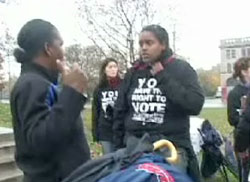Wesley Clark has been chiming in a lot lately on the Shrub War situation. I think he’s a smart guy with a lot of experience in this War stuff, so I’ve created a category for him.
I’m not trying to archive everything the guy does or anything, but once I’ve posted a couple things from the same person (as I am about to- I’ve got some good clips of him from Bill Maher’s show a few weeks back), it will make it easier to find the stuff later if it has its own category.
The Real Battle
Winning in Fallujah Is Just the Beginning
By Wesley K. Clark for The Washington Post.
Air Force Gen. Richard B. Myers, chairman of the Joint Chiefs of Staff, assures us that U.S. and Iraqi government forces have moved steadily through the insurgent stronghold and that the assault has been “very, very successful.” Last night, even as troops fought to secure the final section of the Sunni city, senior Iraqi officials declared it “liberated.” But it’s hardly surprising that the measure of success in Fallujah is elusive: There’s no uniformed enemy force, no headquarters, no central command complex for the troops to occupy and win. At the end, there will be no surrender.
After “winning”: Tactical victory is one thing, strategic victory another. U.S. Marines regroup inside the Khulafah Rashid mosque in Fallujah after taking it Thursday. They left later after routed insurgents regrouped and fired on the mosque. (Luis Sinco — Los Angeles Times Via AP)
Instead, the outcome of the battle must be judged by a less clear-cut standard: not by the seizure and occupation of ground, but by the impact it has on the political and diplomatic process in Iraq. Its chances for success in that area are highly uncertain. Will Fallujah, like the famous Vietnam village, be the place we destroyed in order to save it? Will the bulk of the insurgents simply scatter to other Iraqi cities? Will we win a tactical victory only to fail in our strategic goal of convincing Iraqis that we are making their country safe for democracy — and specifically for the elections scheduled for the end of January?…
But in what sense is this “winning?”
To win means not just to occupy the city, but to do so in a way that knocks the local opponent permanently out of the fight, demoralizes broader resistance, and builds legitimacy for U.S. aims, methods and allies. Seen this way, the battle for Fallujah is not just a matter of shooting. It is part of a larger bargaining process that has included negotiations, threats and staged preparations to pressure insurgent groups into preemptive surrender, to deprive them of popular tolerance and support, and to demonstrate to the Iraqi people and to others that force was used only as a last resort in order to gain increased legitimacy for the interim Iraqi government.
Even the use of force required a further calculus. Had we relentlessly destroyed the city and killed large numbers of innocent civilians, or suffered crippling losses in the fighting, we most certainly would have been judged “losers.” And if we can’t hold on and prevent the insurgents from infiltrating back in — as has now occurred in the recently “liberated” city of Samarra — we also shall have lost…
This insurgency has continued to grow, despite U.S. military effectiveness on the ground. While Saddam Hussein’s security forces may have always had a plan to resist the occupation, it was the failure of American policymakers to gain political legitimacy that enabled the insurgency to grow. And while the failure may have begun with the inability to impose order after Saddam’s ouster, it was the lack of a political coterie and the tools of political development — such as the Vietnam program of Civil Operations-Revolutionary Development Support (CORDS) — that seems to have enabled the insurgency to take root amid the U.S. presence. These are the sorts of mistakes the United States must avoid in the future, otherwise the battle of Fallujah may end up being nothing more than the “taking down” of an insurgent stronghold — a battlefield success on the road to strategic failure.
Troops are in Fallujah because of a political failure: Large numbers of Sunnis either wouldn’t, or couldn’t, participate in the political process and the coming elections. Greater security in Fallujah may move citizens (whenever they return) to take part in the voting; it’s too early to say. But it’s certain that you can’t bomb people into the polling booths.
We should be under no illusions: This is not so much a war as it is an effort to birth a nation. It is past time for the administration to undertake diplomatic efforts in the region and political efforts inside Iraq that are worthy of the risks and burdens born by our men and women in uniform. No one knows better than they do: You cannot win in Iraq simply by killing the opponent. Much as we honor our troops and pray for their well-being, if diplomacy fails, their sacrifices and even their successes in Fallujah won’t be enough.
Continue reading →
